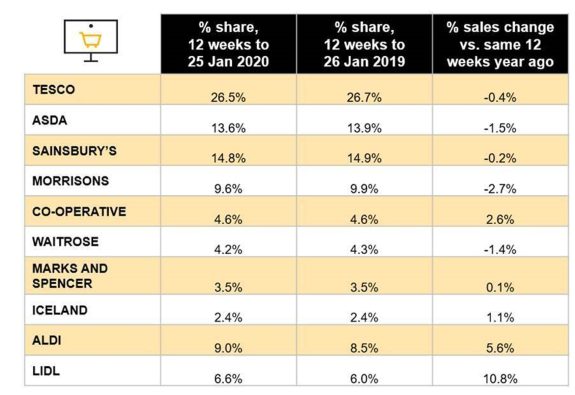Data from Nielsen reveals that there was no post-Christmas recovery for UK supermarkets this January with overall sales growing by only 0.7% in the last four weeks.
This figure is significantly less than the same period last year, in which retailers were revelling in growth of 3.3%. This year, value sales since Christmas fell at the grocery multiples by 0.3%, with volumes also down 1%. Nielsen stated that this was exacerbated by inflation, which was only up by 1.6%.
The continuing mild winter weather was also not enough to give a seasonal boost, with volume sales of traditional ambient grocery products down by 2.8%. However, there was reasonable value growth in soft drinks (+2.8%), crisps and snacks (+2.6%), and confectionery (+2.2%). Beer, wine and spirits also recovered from a poor December, with an uplift of 2%.
Nielsen’s data also shows that sales were weak at all of the supermarkets over the last 12 weeks to 25 January, with the only growth coming from Marks & Spencer (+0.1%), Iceland (1.1%) and Co-op (+2.6%). The discounters Aldi (+5.6%) and Lidl (+10.8) also experienced a rise in sales.
With topline growth still elusive for most retailers, Nielsen found that price cuts and vouchering were continuing to be used by the Big Four supermarkets to entice customers, with a focus on big-name brands in the last four weeks. This led to consumer spend on promotions being maintained at 26% of sales.
Mike Watkins, Nielsen’s UK Head of Retailer and Business Insight, commented: “We know that shoppers are always more conscious of their spending after Christmas, yet this behaviour is impacting the basket more so now than last year. Overall, the number of items purchased per trip is less than last January, resulting in lower supermarket spend – even if visits to stores are up.”
He added: “Little and often’ is still the underlying shopping behaviour, and with shoppers less inclined to spend on a big shop, sales at the Co-op and other smaller store formats, were more buoyant. Although sales have continued to increase at the discounters, growth at Aldi has fallen behind Lidl, and whilst they are both attracting new shoppers and visits to stores are up, they face the same pressures as the rest of the industry in maintaining spend per visit.”
Watkins concluded: “The good news is that consumer confidence is improving, compared to where we were six months ago. However, this change in sentiment will take a number of months to be reflected in sales. Assuming there is no late winter disruption, we anticipate that industry growth will improve to around 1% over the next couple of months, whilst volume growth will remain relatively weak until Easter, where this holiday should provide much-needed momentum mid-April.”
12-weekly % share of grocery market spend by retailer
and value sales % change





